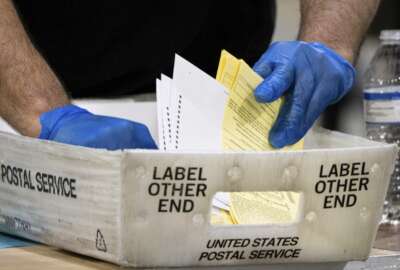Study looking at how agencies make their crucial legal documents publicly available
The Administrative Conference of the United States is concerned with how federal agencies carry out laws, so it launched a study to examine disclosure rules of...
Best listening experience is on Chrome, Firefox or Safari. Subscribe to Federal Drive’s daily audio interviews on Apple Podcasts or PodcastOne.
The Administrative Conference of the United States is concerned with how federal agencies carry out laws. Now it’s launched a study to examine the laws governing disclosure of agency legal activities. And whether there’s a way to streamline legal disclosure. It’s an effort that potentially affects every single agency. For more, the Federal Drive with Tom Temin turned to one of the study group members of The Ohio State University law professor Margaret Kwoka.
Interview transcript:
Tom Temin: So this study group is looking at things to recommend to Congress to do what exactly?
Margaret Kwoka: As it stands right now, there are a variety of statutes that mandate that agencies publish certain types of materials on their websites, or make them affirmatively available. Some of them have to be published in the Federal Register. And so we’re looking at sort of a variety of statutes that impact the question of what agencies must disclose on a proactive basis. And that includes FOIA, of course, the Freedom of Information Act, it includes the E-Government Act, it includes the Federal Register Act, among others, and certainly there are substance-specific areas as well. And each of them can impact an agency’s obligations. But we’re looking specifically at sort of a subset of records that those statutes affect. And by agency, who were sort of looking at agency legal materials, and the guiding principle for us is that, we have a principle against secret law, that agency law should be public, that the public should know what agencies do that set forth, binding rights and obligations of those that are subject to the agency’s authority, as well as other kinds of documents that constrain agency action or explain agency’s decision-making guidance for stakeholders in the general public. And so the idea is to identify key statutory changes that Congress should consider to kind of clarify, potentially strengthen in some areas, and harmonize some areas where statutes are either unclear or overlapping, or sometimes even in some amount of tension with another.
Tom Temin: Well, what is the problem that you’re seeking to fix with disclosure laws and to some extent, I guess, disclosure procedures that derive from those laws? What’s the problem?
Margaret Kwoka: Well, there’s sort of a variety of types of problems that we may well be taking up, though, I will say we’re pretty early in the process. We have a public request for information and comment out already. We also, we’re convening sort of a consultative body that will be giving us input as well. And so it may be premature to give you a definitive list, but I can give you some examples of the kinds of things that we’re looking at. So some of them sound a little bit like technicalities. We have some statutes that refer to each other and do so in a way that makes agencies’ obligations frankly, confusing. And as a result, we may be able to recommend some changes that would clean up those obligations and make it clear both for agencies and the public. There are areas where a statute mandates disclosure of a certain type of material, but the definitions are very unclear. And in lots of those areas, there isn’t a lot of judicial interpretation. And agencies are sort of left to their own devices to come up with what those mean, or might follow DOJ guidance. So there are areas where we think there is room to strengthen the obligations so that more agency legal materials are readily available to the public in a way that the public will be able to access them. So this is an effort to look at the issue very comprehensively, both in terms of how to make the statutes work well with each other, and also how to think about this sort of obligations as one set of obligations instead of the sort of, more or less piecemeal approach that has been taken with various statutory changes.
Tom Temin: We’re speaking with Margaret Kwoka, she teaches law at Ohio State University, and she’s part of a study group convened by the Administrative Conference of the United States. And when you say legal materials, this is more than just case law or materials related to lawsuits, by or against the government?
Margaret Kwoka: Absolutely, in fact, primarily not those sorts of materials, because of course, those materials would already be typically available in a public forum, because the court system would have a filing system that would be accessible. So for agencies in litigation, most of those records are already available. We are looking at the question of whether we might be including recommendations about agency settlements in litigation, which are not always public. But that sort of one very small subset of the issues. I would say more than that, you know, we’re looking at, in particular, rules, I think are already clearly defined in the statutory disclosure requirements. But we are looking at whether all those requirements still are adequate in terms of where the materials need to be published, for example, or how they should be published so that the public can best access them. But more than that, guidance documents, what needs to be put on a website versus what should be published in the Federal Register, and also the scope of what guidance documents really can vary widely from agency to agency, but that could include things like manuals or policies for inspectors or enforcement options, penalties, etc. We’re also looking at adjudication materials, so as it stands right now, the prevailing interpretation of FOIA’s requirement that agencies publish orders made in the adjudication of cases is that that would only really be applicable to decisions that the agency considers precedential and binding on future decision making. We’re looking at the question of whether there may be other broader sets of those kinds of decision-making that should be in fact, affirmatively published instead of –
Tom Temin: Sure, because what’s routine to one person might be precedential to someone else from the external side?
Margaret Kwoka: That’s right. And I think sometimes, we’ve seen instances where agencies may be treating certain issue commonly throughout a volume of decisions where no single one of them has been designated as residential or binding. But that’s the agency practice. And there may not be other records out there that really disclose to the public how that issue is being treated. Is there a way to define this set of records better, in a substantive way, as well?
Tom Temin: And would this, maybe somehow, when this is all resolved, would it speed up the FOIA process by taking away some of the discretion that FOIA officers spend so much time trying to exercise?
Margaret Kwoka: That is one of our hopes is to discuss sort of the costs and benefits of any of the recommendations that we do eventually make, including, and we are looking at examples then and some of the empirical work that we can point to, showing that proactive disclosure of categories of records, in some instances, not in every instance, but in some instances, can and that cut back the number of individual FOIA requests an agency has to process, because those records are already being made available. And so I think there is a potential administrative savings, both dollar savings, but also simply the kind of bureaucratic processing of the bogging down of that other set of obligations as well.
Tom Temin: And what is the timeline here? Your study group will then make recommendations to ACUS, to the Administrative Conference [of the United States], then they would be the ones to actually make them directly to Congress?
Margaret Kwoka: That’s correct. The consultant group is looking at trying to get as much public input as we can, input from our consultative group of experts from agency reps and also from public members. But also, you know, we’re trying to get that done maybe over the summer, and then looking at using the fall to get through the ACUS committee process and or ACUS to consider these recommendations for them to potentially adopt.
Tom Temin: And anyone can comment, not just the FOIA officers, but people that might just be believers in open government that follow these things.
Margaret Kwoka: Absolutely. And we’ve been trying to publish that notice, request for comments very broadly, and get it out to as many of the stakeholders as we can directly but certainly members of the public can, and we encourage them to comment. We are looking to push out this request to all stakeholders and as widely as possible. This input is a really important part of the process and it’s a large part of why I can’t say definitively what direction this product will go in is that we are [moving] to gather all the information that we can.
Copyright © 2025 Federal News Network. All rights reserved. This website is not intended for users located within the European Economic Area.
Tom Temin is host of the Federal Drive and has been providing insight on federal technology and management issues for more than 30 years.
Follow @tteminWFED






